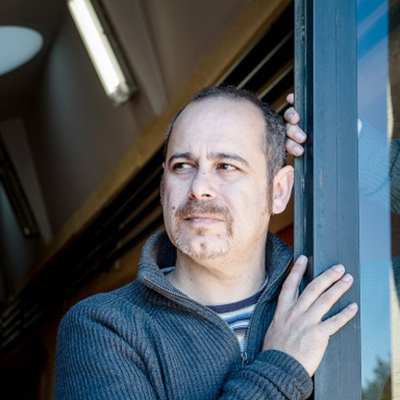Jordi Lara
Jordi Lara (Vic, 1968) is a writer and visual artist. Edicions de 1984 has published his books Papallones i roelles (Butterflies and Poppies), Una màquina d’espavilar ocells de nit (A Machine to Scare off Night Birds), and Mística conilla (Naked Mysticism). In 2012 he wrote and directed the fictional feature film Ventre blanc (White Belly), the fable of some adults who find strength inside the popular capgròs (Big Head) festival character.
«The book [Mística conilla – Naked Mysticism] consists of six stories that don’t aspire to form a novel because they move in different worlds. Yet they do share themes which sustain a number of constants. Take the subject of evasion, for example. There is an emphasis on the individual’s bewilderment, and a certain existentialist void. I am struck by those people who, without realising it, know how to stay clear of the system. They pay for it with marginalisation but it makes them freer. These are characters which fascinate me. Like a village man, in his seventies, married for forty years, who leaves his wife because he has fallen love with a water sprite, which gives him a way to get rid of the pain he bears inside him, the pain of a tragic event, and thus to escape from reality. This happens in one of the stories, titled “Un conte de fades” (A Fairy Tale).»
«Mística conilla is written as a quest for maturity, the age at which you’re in the middle of everything, in limbo, it might be said. “Els llimbs” (Limbo) was one of the titles I had in mind for the book. And, although I don’t like revealing the ins and outs of my writing and what I’ll now tell you is doing just that, I ended up with Mística conilla, first, because I like the words but also because the title suggested to me this desire for evasion, mysticism without dogma and free of ideological devices. It is evasion from a world stripped of culture, of system, but with generosity.»
«In art, anything that doesn’t transcend itself is useless. This forces you to join the avant-garde. And that can lead you into silence. To the void. There is nothing as eloquent as silence. And this constant anxiety that creation is. And, in fact, you can only beat it with death. Hence, you’ll never know what it feels like to have culminated a work of art.»
Interview with Jordi Lara by Montse Serra. Vilaweb (3 November 2016).
—And you, what do you choose?
—Chance poetry. There are many moments in our lives that are full of poetry without our realising it. I choose the meaning that goes beyond our most wretched condition. The sublime that exists in execrable acts. I place that in a framework, which is what all writers do, and this is what we have deeply imbibed from, and what we have wanted to stay with us. I like the contemplative universe, the one predating plastic. I like stone, iron, unfashionable things, which are the leavings of a splendorous past. I like people who are voluntarily marginal because they aren’t part of the production line and this makes them free. I like difficult loves, abandoned roads and confessionals because sins have been whispered in them.
—Where are you coming from?
—We’re all more polyvalent than they want us to believe. They want to label us and turn us into a market commodity. I come from several places. From the world of the culture of roots or the misnamed popular culture, misnamed because popular culture can also include Star Wars. I was also a musician in churches and I like them as a space. All this mindfulness fashion, well I go off and read in cloisters. I come from Vic, a marginal and persistent city. I come from the world of television, which I’ve enjoyed greatly. True modernity is knowing how to live the best of epochs and styles without prejudice.
Interview with Jordi Lara by Ada Castells. Avui Cultura (18 June 2017).




